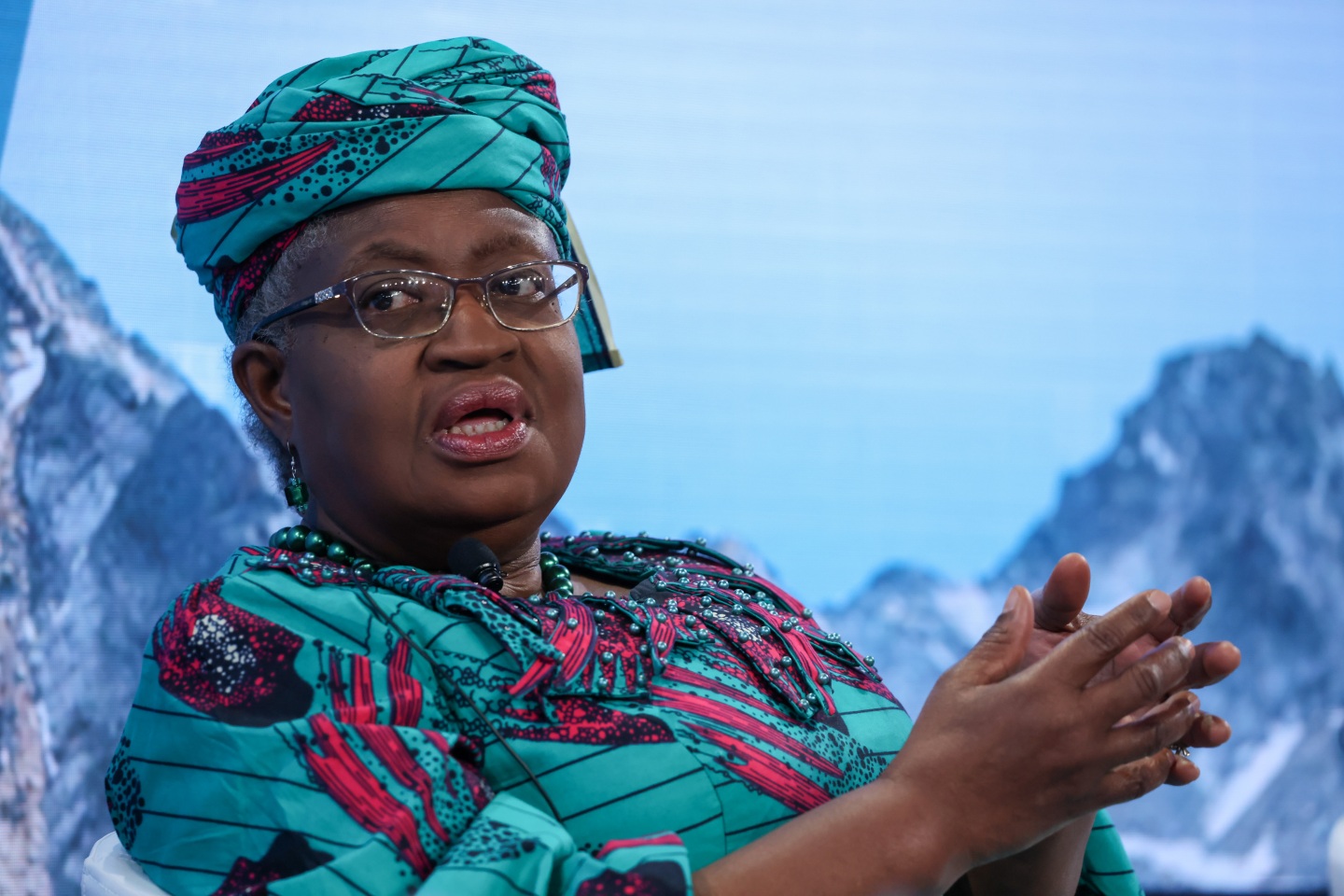
世界貿(mào)易組織(World Trade Organization)的總干事在9月27日警告稱,,一系列同時發(fā)生的危機(jī)正在減緩全球經(jīng)濟(jì)增長,并有可能使全球經(jīng)濟(jì)陷入衰退,。世界貿(mào)易組織由此成為最新一個對世界經(jīng)濟(jì)做出悲觀預(yù)測的全球機(jī)構(gòu),。
今年9月初,世界銀行(World Bank)發(fā)布一份研究報告,,預(yù)測最早明年將出現(xiàn)全球經(jīng)濟(jì)衰退,理由是經(jīng)濟(jì)增長放緩,,世界各國央行收緊貨幣政策以降低通脹,。7月,國際貨幣基金組織(International Monetary Fund)下調(diào)了對全球經(jīng)濟(jì)增長的預(yù)測,,該組織的一名官員警告說,,世界可能“很快就會在全球經(jīng)濟(jì)衰退的邊緣徘徊”。
上周,,世界貿(mào)易組織成為最新一個對避免全球經(jīng)濟(jì)陷入衰退的可能性做出悲觀預(yù)測的政府間貿(mào)易機(jī)構(gòu),。
世界貿(mào)易組織的總干事恩戈齊·奧孔喬-伊韋阿拉在9月27日接受彭博社(Bloomberg)采訪時稱:“各項(xiàng)指標(biāo)看起來并不樂觀?!?/p>
奧孔喬-伊韋阿拉在日內(nèi)瓦參加世界貿(mào)易組織的年度公共論壇外展活動期間對記者表示,,包括食品和能源價格上漲以及俄烏沖突的持續(xù)影響在內(nèi)的多重危機(jī)給世界各國帶來經(jīng)濟(jì)衰退的威脅。
她說:“我認(rèn)為全球經(jīng)濟(jì)陷入衰退——這就是我認(rèn)為我們正在陷入的困境,?!?/p>
修正預(yù)期
世界銀行和國際貨幣基金組織都已經(jīng)下調(diào)了對今年剩余時間和2023年的全球經(jīng)濟(jì)增長預(yù)測,俄烏沖突和全球通脹不斷上升嚴(yán)重影響了它們最初的經(jīng)濟(jì)預(yù)測,。
4月,,世界貿(mào)易組織將其對 2022年剩余時間全球貿(mào)易額增長的預(yù)期從此前的4.7%下調(diào)至3%,同時預(yù)計2023年貿(mào)易額將增長3.4%,。但奧孔喬-伊韋阿拉認(rèn)為,,在10月發(fā)布下一份全球貿(mào)易預(yù)測報告時,該組織可能會進(jìn)一步下調(diào)這些預(yù)測,。
“我們目前正在修正預(yù)測,,但前景并不樂觀。所有指標(biāo)都指向下行數(shù)據(jù),?!彼?月27日的另一場采訪中對路透社(Reuters)表示,,但沒有給出確切數(shù)字?!扒熬翱雌饋砗荀龅?。”
7月,,國際貨幣基金組織將其對2022年剩余時間的全球經(jīng)濟(jì)增長預(yù)期從此前的3.6%下調(diào)至3.2%,,同時預(yù)計到明年全球經(jīng)濟(jì)增長將進(jìn)一步放緩至2.9%。國際貨幣基金組織還將在10月發(fā)布最新的修正估計,。
上周早些時候,,總部設(shè)在巴黎的經(jīng)濟(jì)合作與發(fā)展組織(Organization for Economic Co-operation and Development)警告道,一些主要經(jīng)濟(jì)體明年可能陷入經(jīng)濟(jì)衰退,。該組織還下調(diào)了其對全球經(jīng)濟(jì)增長的預(yù)測,,預(yù)計2022年剩余時間的經(jīng)濟(jì)活動將“低迷”,2023年的經(jīng)濟(jì)增長將放緩至2.2%,,低于該組織今年6月預(yù)測的2.8%,。
“一場完美的風(fēng)暴”
奧孔喬-伊韋阿拉在9月27日警告稱,俄烏沖突導(dǎo)致的食品和能源價格上漲是世貿(mào)組織修正預(yù)期的主要原因,。
“我非常擔(dān)心食品安全,。”她告訴彭博社,?!皼]有足夠的食物讓我很擔(dān)心?!?/p>
俄烏沖突導(dǎo)致全球食品價格上漲,,并擾亂了供應(yīng)鏈。烏克蘭和俄羅斯加起來,,提供了世界上超過四分之一的小麥,,數(shù)個非洲發(fā)展中國家尤其依賴這兩個國家出口的小麥。
但當(dāng)俄烏沖突在今年2月爆發(fā)時,,食品價格開始飆升,。去年春天,俄羅斯封鎖黑海港口,,烏克蘭糧食無法出口,,使聯(lián)合國的基準(zhǔn)世界糧食價格指數(shù)(World Food Price Index)創(chuàng)下歷史新高。盡管自7月與俄羅斯官員達(dá)成允許烏克蘭出口糧食的協(xié)議以來,,世界糧食價格指數(shù)已經(jīng)開始下降,,但價格仍然遠(yuǎn)高于歷史正常水平。
自俄烏沖突爆發(fā)以來,,能源價格也大幅上漲,,尤其是天然氣,,而俄羅斯是世界上最大的天然氣供應(yīng)國之一。全球市場上俄羅斯天然氣供應(yīng)有限,,導(dǎo)致全球供應(yīng)緊張,,天然氣價格上漲,導(dǎo)致一些國家能源短缺,。
奧孔喬-伊韋阿拉告訴彭博社:“目前,,如何獲取能源是一大問題?!?/p>
這不是奧孔喬-伊韋阿拉今年第一次對食品和能源供應(yīng)鏈狀況表示擔(dān)憂,。在5月參加世界經(jīng)濟(jì)論壇(World Economic Forum)時,她將俄烏沖突,、中國的新冠疫情封城措施以及疫情余波列為明年全球供應(yīng)鏈和貿(mào)易增長的重大威脅,。
奧孔喬-伊韋阿拉當(dāng)時在接受美國有線電視新聞網(wǎng)(CNN)采訪時說:“就供應(yīng)鏈而言,所有這些因素都匯聚在一起,,形成了一場真正的完美風(fēng)暴,。”(財富中文網(wǎng))
譯者:中慧言-王芳
世界貿(mào)易組織(World Trade Organization)的總干事在9月27日警告稱,,一系列同時發(fā)生的危機(jī)正在減緩全球經(jīng)濟(jì)增長,并有可能使全球經(jīng)濟(jì)陷入衰退,。世界貿(mào)易組織由此成為最新一個對世界經(jīng)濟(jì)做出悲觀預(yù)測的全球機(jī)構(gòu),。
今年9月初,世界銀行(World Bank)發(fā)布一份研究報告,,預(yù)測最早明年將出現(xiàn)全球經(jīng)濟(jì)衰退,,理由是經(jīng)濟(jì)增長放緩,世界各國央行收緊貨幣政策以降低通脹,。7月,,國際貨幣基金組織(International Monetary Fund)下調(diào)了對全球經(jīng)濟(jì)增長的預(yù)測,該組織的一名官員警告說,,世界可能“很快就會在全球經(jīng)濟(jì)衰退的邊緣徘徊”,。
上周,世界貿(mào)易組織成為最新一個對避免全球經(jīng)濟(jì)陷入衰退的可能性做出悲觀預(yù)測的政府間貿(mào)易機(jī)構(gòu),。
世界貿(mào)易組織的總干事恩戈齊·奧孔喬-伊韋阿拉在9月27日接受彭博社(Bloomberg)采訪時稱:“各項(xiàng)指標(biāo)看起來并不樂觀,。”
奧孔喬-伊韋阿拉在日內(nèi)瓦參加世界貿(mào)易組織的年度公共論壇外展活動期間對記者表示,,包括食品和能源價格上漲以及俄烏沖突的持續(xù)影響在內(nèi)的多重危機(jī)給世界各國帶來經(jīng)濟(jì)衰退的威脅,。
她說:“我認(rèn)為全球經(jīng)濟(jì)陷入衰退——這就是我認(rèn)為我們正在陷入的困境?!?/p>
修正預(yù)期
世界銀行和國際貨幣基金組織都已經(jīng)下調(diào)了對今年剩余時間和2023年的全球經(jīng)濟(jì)增長預(yù)測,,俄烏沖突和全球通脹不斷上升嚴(yán)重影響了它們最初的經(jīng)濟(jì)預(yù)測,。
4月,世界貿(mào)易組織將其對 2022年剩余時間全球貿(mào)易額增長的預(yù)期從此前的4.7%下調(diào)至3%,,同時預(yù)計2023年貿(mào)易額將增長3.4%,。但奧孔喬-伊韋阿拉認(rèn)為,在10月發(fā)布下一份全球貿(mào)易預(yù)測報告時,,該組織可能會進(jìn)一步下調(diào)這些預(yù)測,。
“我們目前正在修正預(yù)測,但前景并不樂觀,。所有指標(biāo)都指向下行數(shù)據(jù),。”她在9月27日的另一場采訪中對路透社(Reuters)表示,,但沒有給出確切數(shù)字,。“前景看起來很黯淡,?!?/p>
7月,國際貨幣基金組織將其對2022年剩余時間的全球經(jīng)濟(jì)增長預(yù)期從此前的3.6%下調(diào)至3.2%,,同時預(yù)計到明年全球經(jīng)濟(jì)增長將進(jìn)一步放緩至2.9%,。國際貨幣基金組織還將在10月發(fā)布最新的修正估計。
上周早些時候,,總部設(shè)在巴黎的經(jīng)濟(jì)合作與發(fā)展組織(Organization for Economic Co-operation and Development)警告道,,一些主要經(jīng)濟(jì)體明年可能陷入經(jīng)濟(jì)衰退。該組織還下調(diào)了其對全球經(jīng)濟(jì)增長的預(yù)測,,預(yù)計2022年剩余時間的經(jīng)濟(jì)活動將“低迷”,,2023年的經(jīng)濟(jì)增長將放緩至2.2%,低于該組織今年6月預(yù)測的2.8%,。
“一場完美的風(fēng)暴”
奧孔喬-伊韋阿拉在9月27日警告稱,,俄烏沖突導(dǎo)致的食品和能源價格上漲是世貿(mào)組織修正預(yù)期的主要原因。
“我非常擔(dān)心食品安全,?!彼嬖V彭博社?!皼]有足夠的食物讓我很擔(dān)心,。”
俄烏沖突導(dǎo)致全球食品價格上漲,,并擾亂了供應(yīng)鏈,。烏克蘭和俄羅斯加起來,提供了世界上超過四分之一的小麥,數(shù)個非洲發(fā)展中國家尤其依賴這兩個國家出口的小麥,。
但當(dāng)俄烏沖突在今年2月爆發(fā)時,,食品價格開始飆升。去年春天,,俄羅斯封鎖黑海港口,,烏克蘭糧食無法出口,使聯(lián)合國的基準(zhǔn)世界糧食價格指數(shù)(World Food Price Index)創(chuàng)下歷史新高,。盡管自7月與俄羅斯官員達(dá)成允許烏克蘭出口糧食的協(xié)議以來,,世界糧食價格指數(shù)已經(jīng)開始下降,但價格仍然遠(yuǎn)高于歷史正常水平,。
自俄烏沖突爆發(fā)以來,,能源價格也大幅上漲,尤其是天然氣,,而俄羅斯是世界上最大的天然氣供應(yīng)國之一,。全球市場上俄羅斯天然氣供應(yīng)有限,導(dǎo)致全球供應(yīng)緊張,,天然氣價格上漲,,導(dǎo)致一些國家能源短缺。
奧孔喬-伊韋阿拉告訴彭博社:“目前,,如何獲取能源是一大問題,。”
這不是奧孔喬-伊韋阿拉今年第一次對食品和能源供應(yīng)鏈狀況表示擔(dān)憂,。在5月參加世界經(jīng)濟(jì)論壇(World Economic Forum)時,,她將俄烏沖突、中國的新冠疫情封城措施以及疫情余波列為明年全球供應(yīng)鏈和貿(mào)易增長的重大威脅,。
奧孔喬-伊韋阿拉當(dāng)時在接受美國有線電視新聞網(wǎng)(CNN)采訪時說:“就供應(yīng)鏈而言,所有這些因素都匯聚在一起,,形成了一場真正的完美風(fēng)暴,。”(財富中文網(wǎng))
譯者:中慧言-王芳
A number of coinciding crises are slowing global economic growth and threatening to tip the world into a recession, the World Trade Organization chief warned on September 27, making it the latest global institution to issue a dark forecast for the world economy.
Earlier September, the World Bank issued a study predicting a global recession as early as next year, citing slower economic growth and central banks around the world tightening their monetary policies to reduce inflation. And in July, the International Monetary Fund downgraded its global economic growth forecast, with one of the organization’s officials cautioning that the world may “soon be teetering on the edge of a global recession.”
Last week, the WTO became the latest intergovernmental trade organization to make a dire prediction about the world’s chances of avoiding a global recession.
“The indicators are not looking good,” WTO Director-General Ngozi Okonjo-Iweala told Bloomberg during an interview on September 27.
Speaking to reporters in Geneva on the sidelines of the WTO’s annual public forum outreach event, Okonjo-Iweala said that multiple crises—including rising food and energy prices and the ongoing effects of the Ukraine War—are threatening countries worldwide with economic downturn.
“I think a global recession—that is what I think we are edging into,” she said.
Revising expectations
Both the World Bank and the IMF have already downgraded their global economic growth projections for the rest of this year and 2023, with the war in Ukraine and rising inflation globally hitting their original economic forecasts hard.
In April, the WTO revised its own expectations of global trade volume growth for the rest of 2022, down to 3% from its previous forecast of 4.7%, while projecting a 3.4% increase in trade volume in 2023. But the organization will likely downgrade those predictions even further when it releases its next global trade forecast report in October, Okonjo-Iweala said.
“We are in the middle of revising our forecasts now but it’s not looking very promising. All the indicators are pointing to downside numbers,” she told?Reuters?in a separate interview also on September 27, while refraining from giving exact numbers. “The outlook is looking gloomy.”
In July, the IMF revised its global economic growth expectations for the rest of 2022 down to 3.2% from the previous forecast of 3.6%, while predicting growth to slow further to 2.9% by next year. The IMF will also release its latest revised estimates in October.
Earlier last week, the Paris-based Organization for Economic Co-operation and Development warned that several major economies could fall into a recession next year. The organization also downgraded its global economic growth forecasts, predicting “subdued” activity for the rest of 2022 and economic growth to slow to 2.2% in 2023, down from 2.8% the body had projected in June.
“A perfect storm”
Okonjo-Iweala warned on September 27 that rising food and energy prices due to the war in Ukraine were the main reason behind the WTO’s revised expectations.
“I am very concerned about food security,” she told Bloomberg. “The specter of not having enough food is one that worries me.”
The Ukraine War has sent food prices rising worldwide and scrambled supply chains. Ukraine and Russia, combined, supplied over a quarter of the world’s wheat, with several developing African nations especially dependent.
But when the war broke out in February, food prices began to soar. A Russian blockade of Ukrainian food exports sent the UN’s benchmark World Food Price Index to record highs last spring, and while they have begun declining since a deal was struck in July with Russian officials to allow grain exports from Ukraine, prices are still well above the historical norm.
Energy prices have also risen significantly since the war, especially for natural gas, of which Russia is among the world’s largest producers. A limited supply of Russian gas in global markets has crunched global supply and raised prices, leaving several countries starved for energy.
“Access to energy is creating problems at the moment,” Okonjo-Iweala told Bloomberg.
It isn’t the first time Okonjo-Iweala has expressed concern over the state of food and energy supply chains this year. While attending the World Economic Forum in May, she cited the war, COVID-19 lockdowns in China, and the aftereffects of the pandemic as significant threats to global supply chains and trade growth over the next year.
“All these factors are coming together for a perfect storm really in terms of supply chains,” Okonjo-Iweala told?CNN?at the time.






